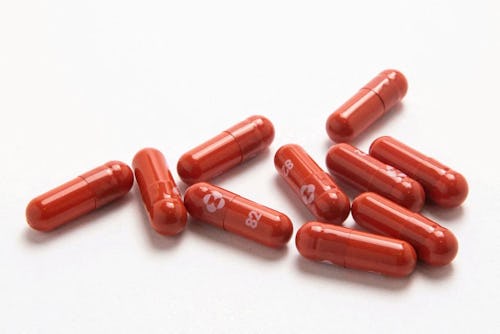So when are these COVID treatments going to be available?
The FDA just authorized 2 oral antivirals to treat COVID.

In a race to prevent the worst effects of Omicron, the FDA just granted emergency authorization to pills (for the second time this week) that will help treat COVID. Molnupiravir, manufactured by Merck, was approved for use by adults who are 18 and older, test positive for COVID and are at high risk of becoming severely ill from the virus.
In clinical trials, people who took the molnupiravir regimen twice a day for five days — or 40 pills total — reduced their risk of hospitalization and death by about 30%, according to the Washington Post. The Biden administration has already committed to buying at least 3.1 million courses of the pill between now and early January and will be available in the next several days, according to Merck’s website.
But like any prescription med, the Merck pill is not without its potential risks. It works by inserting “errors” into the COVID viruses’ genes to stop it from replicating, according to the New York Times. This has led to concerns over its impacts on fertility and potential to cause bone and cartilage damage, which is why pregnant women and children under 18 have not been authorized to take it and also why France just cancelled its order of the antiviral drug, according to Reuters. On top of that, some experts fear that the pills’ interference with virus DNA could lead to the emergence of new COVID mutations.
The other pill authorized by the FDA this week was Pfizer’s Paxlovid, which has shown far more promising results. Paxlovid will likely work against Omicron and it reduced the risk of hospitalization and death by up to 88% when it was given to unvaccinated adults within 5 days of contracting the virus, according to the New York Times. The regimen, which was approved for people who are 12 and older, consists of 30 pills taken over the course of 5 days. People who are infected will take three pills at a time: two Paxlovid and one ritonavir, which has been used to treat HIV for years.
Paxlovid also has its limitations — it has been shown, in preliminary trials, to interfere negatively with certain medications and is expected to be in relatively short supply in the coming weeks. Although the pill will also be available in the U.S. in a matter of days, only 65,000 Americans will have access to them by next week, per the Times. Two-hundred thousand more are expected to be available by January, far less than Merck’s pledge of 3 million.
It’s worth noting that the FDA explicitly approved the Merck regimen for those “whom alternative COVID-19 treatment options authorized by the FDA are not accessible or clinically appropriate,” which is the long way of saying that Merck’s treatment is probably not going to be most people’s first choice if they can also access Pfizer’s. Still, we are at a point in the pandemic when we’re going to have to use every tool in our arsenal to prevent more deaths, no matter how imperfect they may be.